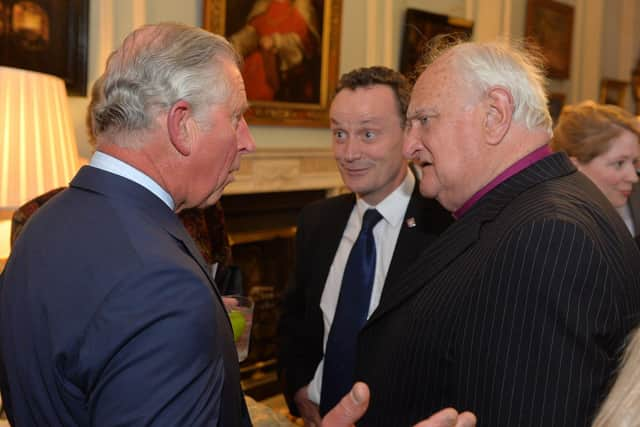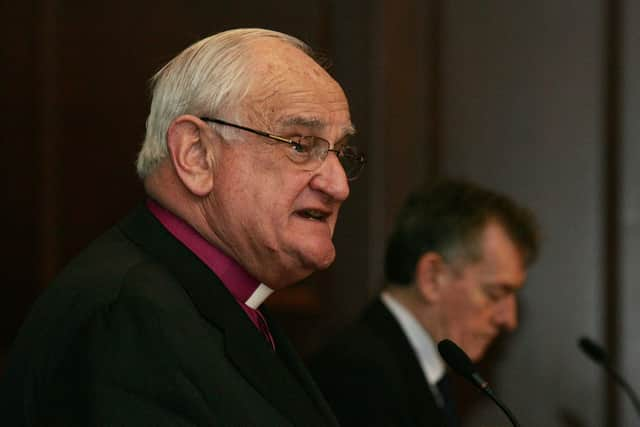Ian Jeffers recommends compensation for family members of those killed in conflict, 7% of whom were from Derry
and live on Freeview channel 276
Mr. Jeffers, who stands down on Friday, has made the recommendation in a new advice paper on the provision of a bereavement payment scheme and services for people bereaved as a result of the conflict.
He defines a bereaved person according to the Victims and Survivors (NI) Order 2006 as ‘someone who has been bereaved as a consequence of a conflict-related incident’.
Advertisement
Hide AdAdvertisement
Hide Ad"This is a broad definition which does not restrict bereavement by familial connection or the cause of death. It is not our place to create a hierarchy of victims and survivors,” the paper declares.


Mr. Jeffers said he understood some will oppose a wider definition of victims.
“We acknowledge that for some this is wrong, and that the Commission should not equate the victimhood of the family of a person killed in a bomb explosion with that of the family of the person who died detonating it.
"Those who make decisions around a scheme for the bereaved may decide, as with the Victims’ Payment Scheme, to differentiate, but that is not what the Commission has been established to do,” he states.
Advertisement
Hide AdAdvertisement
Hide AdThis recalls the negative reaction of unionists to Denis Bradley’s and Robin Eames’ 2009 recommendation that the nearest relatives of people who died as a result of the conflict should receive a one-off ex-gratia recognition payment of £12,000.


This was not advanced by the British Labour administration of the day due to unionist opposition to payments to the family members of republican and loyalist paramilitaries killed during the conflict.
Mr. Jeffers’ advice paper notes ‘the inadequacy of financial provision for the bereaved’ which has become ‘increasingly apparent as a result of the Troubles Permanent Disablement Payment Scheme (TPDPS) which was established by the Victims Payment Regulations 20203 and became operational in 2021’.
He goes on to state that the British Government’s Northern Ireland Troubles (Legacy and Reconciliation) Act has served to limit ‘the continuation and commencement of civil compensation claims’.
Advertisement
Hide AdAdvertisement
Hide Ad“We are keenly aware that in the current financial circumstances, the availability of funding may be an obstacle to the implementation of a meaningful financial scheme for the bereaved. The adoption of such a stance is, in the Commission’s view, unsustainable,” he states.
The report outlines how seven per cent of those killed during the conflict lost their lives in the Derry area.
"Geographically, around 37 per cent of deaths occurred in Belfast, 9 per cent in the Newry and Mourne area and seven per cent in Derry/Londonderry,” it states.
A further breakdown of the victims and the bereaved reveals:
Advertisement
Hide AdAdvertisement
Hide Ad- 3,210 (91%) of those killed were male, and 322 (9%) were female.
- 54% of those killed up until 1998 were civilians.
- 25% of those killed between 1969 and 1998 were aged between 18 and 23.
- The period 1971 – 1976 accounted for just over half of all deaths.
- Paramilitary groups were responsible for 87% of deaths.
- 16% of all Troubles-related deaths between 1969 and 2001 were members of paramilitary groups.
Mr. Jeffers states: "Figures from 2020 provided by the Executive Office, estimate that 6,828 people would fall within the category of a spouse, child or parent of a bereaved person, and that there are a further 6,107 siblings.
"These figures are three years’ old, and are estimates, included for illustrative purposes only.
“Those killed can be given many labels: civilian, paramilitary, police officer, soldier, informant, disappeared, father, husband, son, brother, mother, wife, daughter, sister, partner, or loved one. The experiences of those bereaved are shaped by the label attached to their loved one.”
The Victims Commissioner makes the following 13 recommendations:
Advertisement
Hide AdAdvertisement
Hide Ad- Any financial scheme, irrespective of the structure, must provide a meaningful level of payment.
- A statutory scheme would likely take longer to implement but would bring certainty and legally enforceable rights.
- Beneficiaries should comprise: a spouse/partner, parent, child and siblings. Each should be entitled to the payment in their own right. Eligibility should be as per the definition of a bereaved victim or survivor from the Victims and Survivors (NI) Order 2006.
- Deliver the financial scheme via a one-off payment.
- The date parameters for eligibility is from 1966, without a cut-off date.
- Qualifying individuals should be able to access the scheme, regardless of where they live. People were bereaved across Northern Ireland, Great Britain, the Republic of Ireland and in mainland Europe.
- The scheme should not be means tested, or previous compensation awards taken into account as regards eligibility.
- An actuarial specialist should be engaged to provide a more accurate estimate of costs.
- The scheme should include an appeals mechanism.
- A robust monitoring and review mechanism should be built into the scheme’s delivery.
- An Equality Impact Assessment should be conducted as part of any consultation process.
- A communication strategy and action plan should be developed and agreed with stakeholders.
- Organisations providing services should be equipped to meet demand for appropriate bereavement-related and more general Troubles/conflict related services in the coming years.
Costings contained in the report suggest one-off payments to 6,828 spouses, parents and children and 6107 sisters and brothers of victims (12,935 people in total) would cost £129,350,000 if set at £10,000; £258,700,000 if set at £20,000; £646,750,000 if set at £50,000; and £1,293,500,000 if set at £100,000.
Recurrent annual payments of £2000 per annum, alternatively, would cost £258,700,000 over 10 years; £517,400,000 over 20 years; and £776,100,000 over 30 years.
Recurrent annual payments of £5000 per annum would cost £646,750,000 over 10 years; £1,293,500,000 over 20 years; and £1,940,250,000 over 30 years.